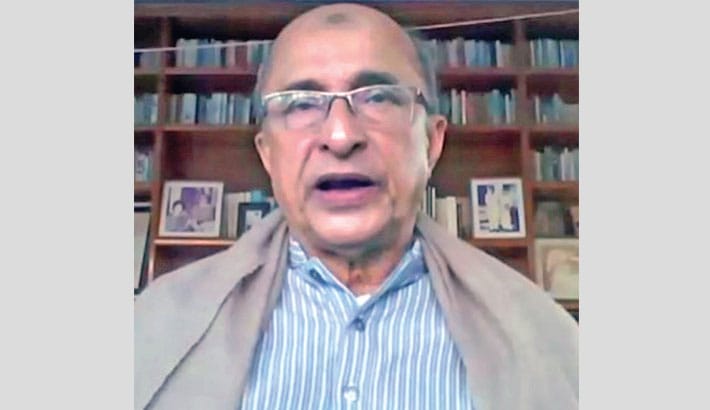The government has no plan to privatise power distribution and transmission systems in power sector immediately, power and energy adviser to the Prime Minister Dr Tawfiq-e-Elahi Chowdhury Birbikram said on Saturday.
“We cannot afford to provide transmission and distribution to private sectors because electricity is a public goods,” he remarked.
“If we look at India, the private electricity supplier Tata halted power generation of 1,000 MW power plants because of the price conflict, which led the general people suffer despite surplus electricity generation,” he added.
He shared his views while speaking as the chief guest at “50 years of Victory and Progress of Power Sector,” vitrually organsied by Forum for Energy Reporters Bangladesh (FERB).
“Before creating any plan and its implementation, it is important to look at the past, take lesson and apply our merit, courage and confidence to come up with effective solutions,” said PM’s power and energy adviser.
Since assuming power in 2009 , the government has reformed the power sector by changing various policies, said Dr Tawfiq-e-Elahi Chowdhury, adding, “Till date, the power sector and the country’s economy are in good shape because of the visionary leadership of our Prime Minister.”
Bangladesh provided 2.5 US cent per unit before the formulation of Private Sector Power Generation Policy of Bangladesh 1996. The tarrif was the lowest compared to those in India and Pakistan at that time, he added.
With regard to renewable energy, Dr Tawfiq-e-Elahi Chowdhury also said, “We need to ensure proper renewable energy storage to ensure uninterrupted supply as we don’t have hydropower as backup.” State Minister for Power and Energy Nasrul Hamid addressed the meeting as the special guest while Policy Research Institute Executive Director Ahsan H Mansur was the guest of honour and BIPPA President Imran Karim made the welcome speech. Speaking as the special guest, Nasrul Hamid said that it has become challenging to provide quality electricity and minimise the electricity price owing to several issues.
“The incumbent government started developing the power sector from the scratch and we have taken the power sector as the key sector to develop the country, he added.
In the 2009 election manifesto, the government promised to provide electricity to all households by 2021. At that time the country faced a financial crisis and none even wanted to invest, said the state minister.
“However, we turned around within two to three years owing to the initiative of the incumbent government,” said Nasrul Hamid adding, “A special law was enacted to supply electricity. Despite criticism of this law, the power sector achieved success.” In addition, Ahsan H Mansur said that power sector needs sufficient investment in order to ensure uninterrupted power supply, affordable electricity and power security.
“We need billions of investment in transmission and distribution systems to achieve the milestones set for the power sector,” he added. He also emphasised on making regulatory framework to give transmission and distribution access to the private sector.
Director General of Power Cell Mohammad Hossain was present as the keynote speaker on the occasion.
While presenting the keynote paper, Mohammad Hossain said that 47 percent of the people had access to electricity in 2009, and now it rose to 99 percent. At present the country’s power generation capacity has increased to 24,000 MW, he added.

